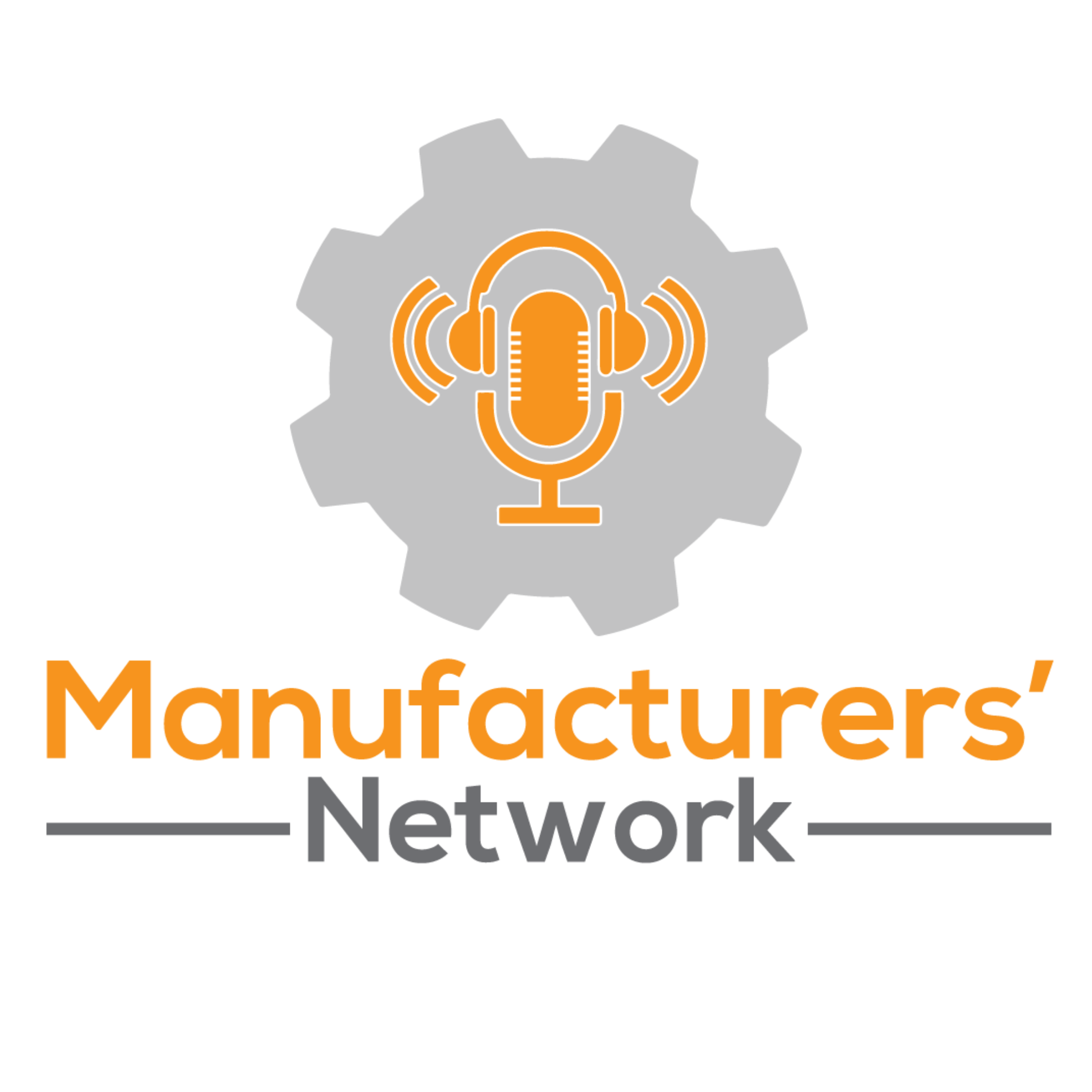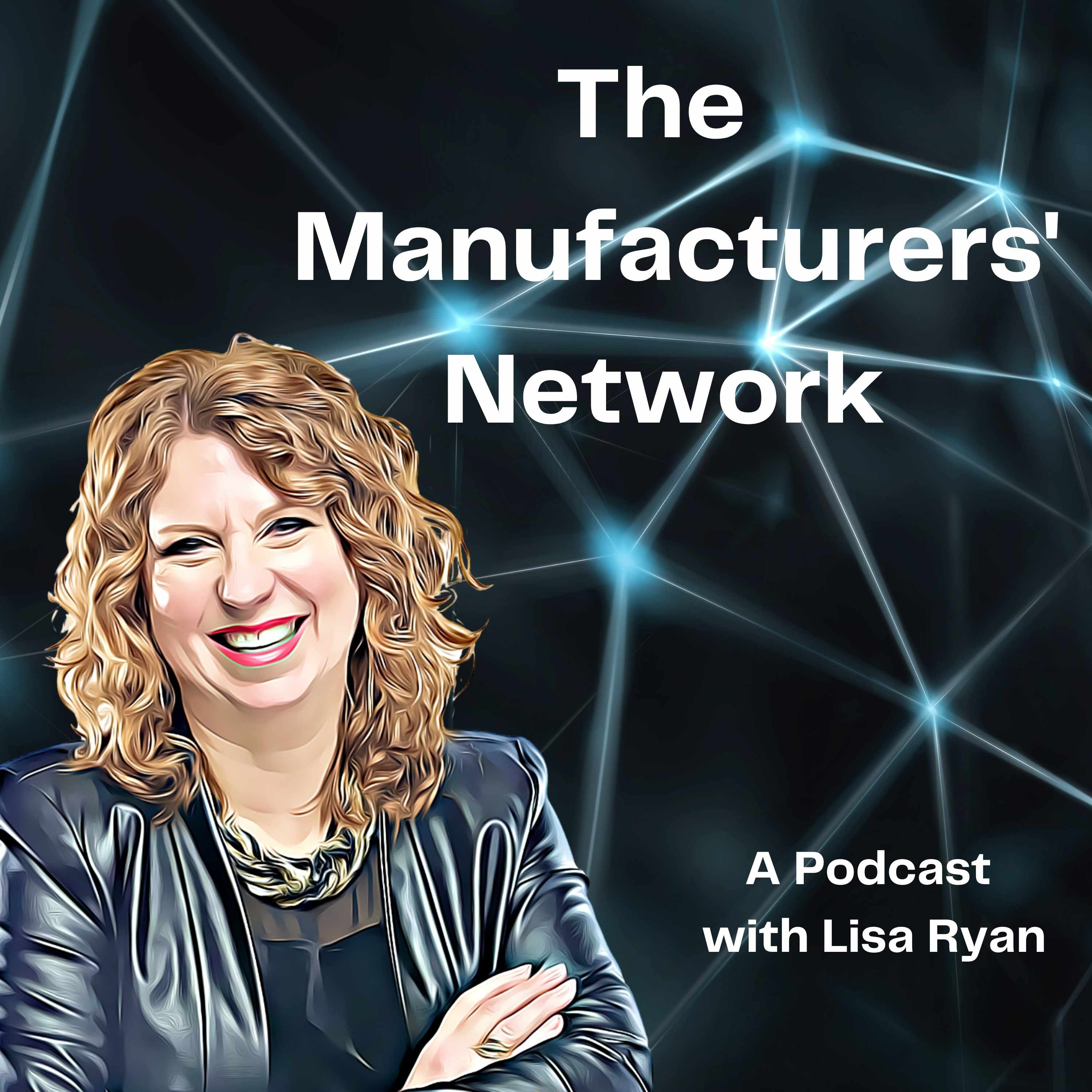How Companies are Bringing Manufacturing Home from China with Rosemary Coates
Connect with Rosemary Coates:
Email: rcoates@ReshoringInstitute.org
Website: rcoates@ReshoringInstitute.org
LinkedIn: https://www.linkedin.com/in/rosemarycoates/
Lisa Ryan: Hey, it's Lisa Ryan. Welcome to the Manufacturers' Network Podcast. My guest today is Rosemary Coates. Rosemary is the founder and executive director of the Reshoring Institute, a 501 C three nonprofit and nonpartisan organization focusing on expanding US manufacturing. She's also the President of Blue Silk Consulting, a supply chain management consulting firm.
Ms. Coates has been a management consultant for 30 plus years, helping global supply chain clients worldwide. In the early 2000s, she assisted many companies source products from China and set up operations there. But now helps companies with their global operation strategy by determining what products to manufacture in each market, including what can be manufactured in America. Rosemary, welcome to the show.
Rosemary Coates: Thank you for having me. I appreciate it.
Lisa Ryan: Absolutely. Would you please share with us a bit of your background and journey that I alluded to in your bio?
Rosemary Coates: I've had a long history of being in manufacturing firms. After I graduated college, working at solar turbans and San Diego all the way to graduate school. I got recruited out of Grad school to Hewlett Packard in Silicon Valley - that's where I live, now. After that, I went into management consulting at KPMG, a partner in another firm. So I'd been doing management consulting and software implementations in the supply chain sectors for many years.
I worked for SAP for five years as manager of their business consulting group in the West. At one point, I was so interested in China, and, of course, you may know that in the early 2000s, everyone was going to China because the market was opening after trying to send it there. It was a low-cost environment, and everyone's competitors were going. I was very interested had always been interested in China and have done a few projects there. I decided to break out on my own, and I started a consulting firm, and that was focused on helping companies and global supply chains, particularly in Chinese manufacturing.
I did that for about 15 years, helping lots of companies shift their operations to China and did many global expansion projects and so forth, which was fun to do. Then along came the 2014 presidential election when Barack Obama and Mitt Romney were China-bashing like crazy, and I'm thinking, "Holy cow, I can't tell anybody what I do for a living. This is awful."
That plus, I'm shutting down so many factories in America. I did a lot of that, and it just really started to get to me. I began to feel like this is just not the right direction to go. We shouldn't be shipping all of our capability and manufacturing overseas. It just started weighing heavily on me. At the same time, because of the presidential election and all the China-bashing that was going on, some of my clients started talking to me about the potential for bringing some manufacturing back. That sparked this whole idea of reshoring.
I gathered some of the people, the top managers that worked for me together, and we designed a process and approach for determining where in the world you should manufacture. We started helping companies understand if they could move to manufacture back to the US or add additional countries, and you know all kinds of decision points. It was evident that reshoring was going to become a trend. I felt strongly that clients were interested in moving back to America to make an economic case. Out of that grew the Reshoring Institute. We incubated under the University of San Diego. They have an extensive supply chain program there. I'm on the board at USD. That's also my Alma mater from graduate school. I asked them if they would help us get started, and they were accommodating. For three years, we incubated the Reshoring institute at the University of San Diego and took graduate student interns to help us do the research and get our sea legs. Then we went nationwide, and today, the Reshoring Institute is where I spend most of my time. We're nonprofit, so we do all kinds of global supply chain strategy work and consulting work - small consulting projects and big international projects.
We're working on a giant project for the State of New York in manufacturing, and we help analyze, determine, and implement manufacturing projects to expand manufacturing in America. That's where we are today. We're associated with about 15 universities across the nation. We take graduate student interns that are very often scary smart and teach them about manufacturing. They're going to be the leaders of the future, and they help us with our research.
Lisa Ryan: What would you say the things that you've seen? We've heard so much about manufacturing coming back to America, and China is certainly not as cheap as it used to be when it came to any of their manufacturing processes. So it's not like they're saving as much money as they used to, but besides the cost savings, what are some of the most significant benefits that you've been able to show manufacturers about coming back to the United States.
Rosemary Coates: Well, you're right about cost increase, although that is not the primary driver. Wages in China are maybe a quarter of what they would be in the Western world, and in today's environment, we saw some financial incentives. For example, the tax reform act of 2017 was helpful to manufacturers. They got a big tax break, but it didn't drive much manufacturing back. It was just a tax break.
Then, the trade war intended that it would drive manufacturing back to the US. Instead of just cause, manufacturers absorb more costs because they were paying the tariffs on imported parts and finished goods coming back into the US. That didn't drive any manufacturing back, although there was certainly talk. We were moving along, getting projects here and there, and doing our research. Then the pandemic made a big difference because it introduced risk.
The economic incentives were there all along, but the risk is a whole other aspect, and many companies recognize that. It's time to think about their strategies more in-depth and potentially bring manufacturing back to America. The risk is certainly top of mind, with most executives potentially mitigating that risk through manufacturing close in the US or either in Mexico, sometimes Canada, so that's one aspect. But, of course, the economics have changed pretty significantly, and logistics costs are high.
We're working on a project with the State of New York and are interviewing 50 companies in manufacturing. One after another, after another, they tell us that logistics costs are just choking them. For example, getting a container from Shanghai to LA used to be 1000 bucks now. It's as high as $15,000. The costs are exponential - most companies are paying at least three or four times more.
That's a big issue that will eventually straighten out because it's based on the imbalance of containers around the world, and once that gets straightened out, we'll probably see some reduction in those costs, although not back to 2019 rates. So we should see some calming of that. So that's undoubtedly one of the factors.
Another factor has short cycle times. If you have to wait six weeks to get the product from China, it's tough to fill your orders fast. Amazon has taught us all - whether industrial or personal consumers - that we want our stuff overnight. We're not going to wait six weeks. We want it in two days maximum. That's driven this whole attitude of shortening of cycle times in general across the industry. So having local manufacturing is helpful in that regard.
Another aspect is engineering changes. It's tough to do those when you're at a distance. You've got an engineering problem. You get an engineer to hop on a plane, and tomorrow, they can be at a factory in Indiana or Alabama or somewhere. That makes a big difference in how quickly we respond to the marketplace.
Lisa Ryan: Not only that, but you have your suppliers local, whether the United States, Canada, or Mexico, so it's not the slow boat from China. There's also something about buying products that are made in the United States. I know that you did some research through the Reshoring institute that talked about Americans' preferences for that made in the USA label. Would you mind telling us about that study and what you have found?
Rosemary Coates: That was interesting. Since I'm working in that sector, there wasn't anything too surprising to me, but we surveyed 500 people across America and asked them some simple questions. These were all age groups from 18 to about 85, all education levels high school graduates, all the way to PhDs. The group included men, women in all regions of the US. We asked them some simple questions – "do you prefer to buy products made in the US? If so, would you pay more for them? If so, how much more?" The responses came back affirmatively. Somewhere around 60 or 70% said, yes, they prefer products made in the US. Yes, they would pay more for them, and the amount is between 10 and 20% more. If you get an exact product from China and one made in the US side by side, consumers are willing to pay 10 to 20% more for the product made in the USA. They indicated to us why there is a perceived better quality of products made in the US now.
We didn't qualify that in any way. We didn't say good, bad, and indifferent. We didn't say any of that - we just said, "Do you think that products made in the US are better quality? And the answer was resounding yes. There's a perception and now why that's very important because, if we can manufacture in the US, for no more than, say, 10 to 15% more cost is 10 to 15% more. Americans perceive the quality is higher and are willing to pay more for it, so we use that number when calculating the cost of manufacturing in the US versus manufacturing in China or other low-cost countries. We know if we can get that cost within 10 or 15%, we got a winner.
Manufacturing here has got a lot of advantages. It's a faster turnaround time. It's perceived higher quality. Whether it is or it isn't, it's perceived as higher quality. It's a speedier engineering change order. It's better logistics. It reduces your carbon footprint and on and on and on. So there are a million reasons why you would want to do it based on that economic factor.
Lisa Ryan: When I think about it, there's also the softer side of it. It makes it easier for employees who want to work for a company that is made in America. A company that is keeping jobs here. There's that certain aplomb that comes with that. When you're looking at Millennials and Gen Z - the newer generations coming into the workforce, they want a company with a mission. If that manufacturer can say our mission is to bring you the highest quality products made right here, it will be even easier for them to attract talent. We all know that there is not enough talent to go around right now.
Rosemary Coates: There's a huge shortage across the board and workers. We call that economic patriotism. It's based on the value of what you're willing to pay and how you perceive companies. There's a general preference among Americans to buy products manufactured here and to work for companies that manufacture in the US. I think it's awesome.
Lisa Ryan: I had a guest a couple of weeks ago on the podcast who talked about this. I knew the numbers were similar, but I didn't realize they were that expansive. China has the number one GDP percentage of the GDP, like a 20% of manufacturing, the US is at 18%, and these numbers may be slightly different and going off the top of my head. But where they do it with 200 million people, we do it with 20 million. The opportunity to showcase what we do in the technology and the efficiency of American manufacturing puts every other company on the country on the planet to shame.
Rosemary Coates: So you know that's a critical point - we don't want the 23 cent an hour T-shirt production back. Bangladesh or Myanmar - some of these low-cost countries. We want to have come back to the more sophisticated, more skillful requirements and environment for manufacturing. We want to put people back to work that makes a living wage and because, if we don't, we have to supplement their income with welfare. We don't want to create a bigger welfare state. What we want to do is bring in higher-skilled manufacturing jobs. Instead of putting pegs in holes, you run the robot that puts the pegs in holes. The robot technician is different from an unskilled Laborer. That's what we want. We want to focus on those higher-tech higher-skilled jobs, to bring them back because they pay a better wage, which creates better productivity for us.
We sometimes hear politicians saying, Oh, we want to bring all the jobs back from China, and I'm like, that's not what we want. We don't want all that low-skilled stuff coming back. We want a more sophisticated environment and to move up the maturity curve for industry 4.0.
Lisa Ryan: We've heard that trying to leave China can be troublesome. What have you experienced when companies are trying their best to bring manufacturing home?
Rosemary Coates: That's a big one. Because I spent so much time in China, I'm very familiar with the craziness that can go on there. I've had clients who said, "okay, let's pull everything out of China and move back. We think we can make a case for it. We're going to build a new plant somewhere in the Midwest and bring everything back. At that point, I know I have to have a little tough conversation with the CFO.
First of all, most of the employees in China are on employment contracts. That means that when they go to work for a company, they sign up for one or two years and have an employment contract. If you close your plant, you must pay out all those employment contracts. Surprise! That's a big surprise for a lot of companies. So even if you're sourcing there and you have a dedicated production line, you may be caught in that situation.
Another thing is tools, dies, and molds. Once you establish that kind of thing in China, even if you think you own them, you believe they are written into your contract appropriately. You're probably never getting them back. There are a couple of reasons for this. First of all, there's a general culture that they become part of the infrastructure. So to take apart the infrastructure is just not allowed. And secondly, if it's any technology, the Chinese government won't allow it to be exported.
You're probably going to have to write off all your machine tools, molds, everything, especially if you've had molds made in China, which many companies do because they're maybe a 10th of the cost of a mold made in the US. You gotta leave those behind. In terms of IP, here you are shutting down production, and the Chinese factory is learned how to make your goods. They have your IP instructions on manufacturing. They have your molds. They have your tools. So to say okay, we're going to stop making products there and move away, you've got to understand that the Chinese factory will continue to make your product. They're going to sell it under a slightly different name worldwide, and you're going to find yourself competing with your former factory in China. That's a problem.
Sometimes you have to apply for permits to leave China. It's complicated and expensive, and you should go into this decision with your eyes open. We help a lot of companies in that regard, even though it's bad news. You need to know about it. You need to know what your costs are and your risks and leave an environment like that.
Lisa Ryan: This brings us to exactly what you do at the Reshoring Institute. How can you help people listening to the podcast and may want to start considering bringing their business back to the States? Would you please share how you help your clients? Also, what's the best way to get in touch with you?
Rosemary Coates: One of the first things I would recommend is to go to our website, www.ReshoringInstitute.org. We publish all of our research there. It's a complete website, full of all kinds of goodies that you can look at and determine that we also provide low-cost consulting work. Because we're a nonprofit, we have world-class consultants that have been in the business for 20-30 years. I've got a spectacular team. We do consulting projects at roughly half price of what you would get anywhere else. We help you find sources, supplier substitutions for foreign suppliers. For US suppliers, we do factory location, all kinds of design work.
We can certainly help in that regard. Again, you can contact us through the website, or you can contact me directly, and my email is rcoates@ReshoringInstitute.org.
Lisa Ryan: Wonderful. Rosemary, it has been an absolute pleasure having you on the show today. Thanks so much for joining me.
Rosemary Coates: Oh, thank you
Lisa Ryan: I'm Lisa Ryan, and this is the Manufacturers' Network Podcast. We'll see you next time.


